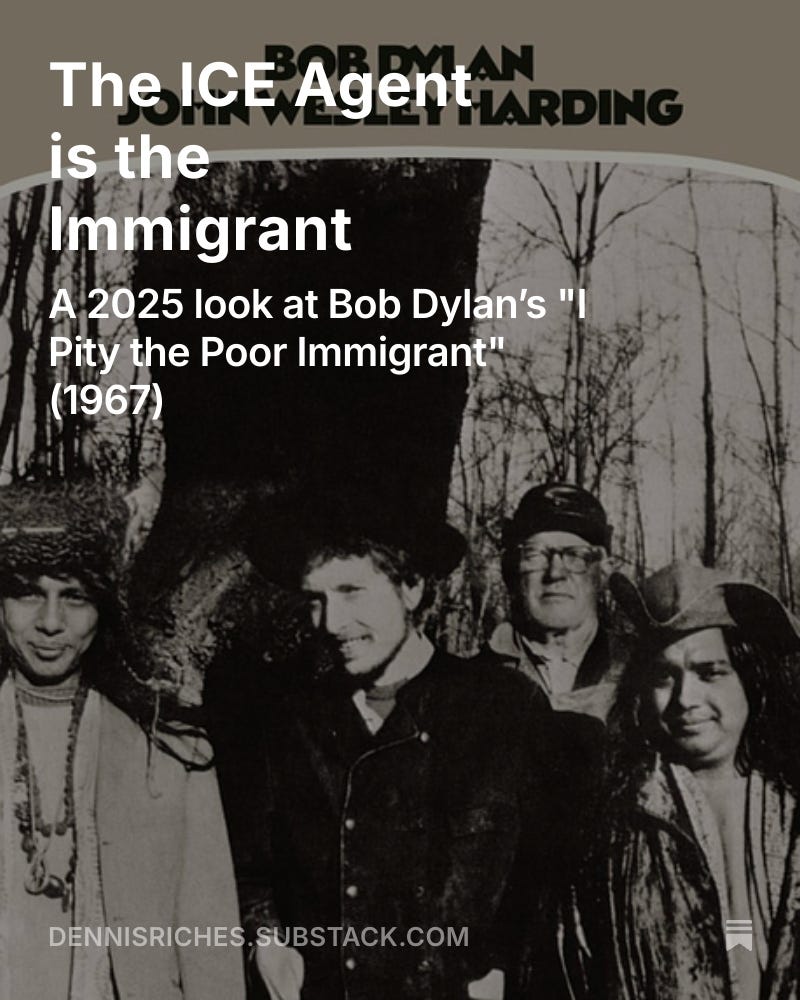If you never knew Bob Dylan’s song about “the poor immigrant”, or if you recall it faintly, you might think this plaintive ballad was a homily to the poor migrants who toil for low wages—specifically because of their vulnerable status—on American farms and in the American service industry. Their employers exploit them with low wages that would be unacceptable to anyone with the rights of citizenship. They always had to be “illegals” in order to maximize profit and provide low-cost food for the “legals”. When you hear Dylan (or Joan Baez or others who have covered it) sing the opening lamentation “I pity the poor immigrant,” you might expect a message of empathy is going to follow.
At this time when migrants and minorities are the subjects of vicious fascistic hatred, it would be a mistake for both fascists and the partisans fighting them to take this song literally. The immigrant in the lyrics is not an immigrant in the everyday sense of the word.
A quick review of early critical takes on the lyrics shows that no one in 1967 was too concerned that the song could be fuel for nationalist, anti-immigrant sentiment. Illegal immigration wasn’t the overheated issue that it is today. Many listened to the song casually and thought it was pro-immigrant. It’s only perhaps when you read the lyrics that you see the condemnation of the immigrant and start to wonder what Dylan—the progressive voice of the 1960s—was really trying to say.
Critics developed a theory that the song was derived from Leviticus, that the immigrant was the outcast or wanderer who left his tribe and traditions and suffered for it. I doubt that Dylan, in 1967, with young children and recording and composing contracts to meet, was doing much Bible study. It seems more likely that he had simply seen the larger picture of what his country was all about. There are the recent migrants, but the larger truth is that everyone in the “New World” is an immigrant even if they have roots going back to the Mayflower. The immigrant is the ICE agent, not his target. The United States is a nation of rootless people that has always been seething with greed, resentment, fear, and loathing, a nation of immigrants who took the shortest road to power and wealth by founding a nation built on slavery and theft of the land of the original inhabitants. Even if you are tenth generation, you are still the immigrant in this song (lyrics below).
Coincidentally, just after I was listening to this old tune, Shahid Bolsen once again echoed my thoughts in the video he released on July 9, 2025:
Americans are homeless as a people… America has the culture of a bus terminal. Everybody is from elsewhere… My lineage decided to leave the lands of their birth, the lands of their heritage where their people had probably been for centuries… They uprooted and resettled in this big bus terminal of America. And now we have no connection, no link, no experience, no memory of the actual lands that our families came from… I’m sure it seemed like a good idea at the time, but what it amounted to was deciding that they and their progeny would be homeless, rootless, with cultural heritage only something to be imagined. None of us today would belong in the countries that our families came from. “American” is just a synonym for “displaced”, for “hollowed out”. What follows the hyphen is like a stamp confirming that what precedes the hyphen has been nullified and has been emptied out… “Irish-American” equals “Irish no longer”. They were born and raised in a bus terminal. Americans are homeless.
I pity the poor immigrant
I pity the poor immigrant
Who wishes he would’ve stayed home
Who uses all his power to do evil
But in the end is always left so alone
That man whom with his fingers cheats
And who lies with every breath
Who passionately hates his life
And likewise, fears his death
I pity the poor immigrant
Whose strength is spent in vain
Whose heaven is like Ironsides
Whose tears are like rain
Who eats but is not satisfied
Who hears but does not see
Who falls in love with wealth itself
And turns his back on me
I pity the poor immigrant
Who tramples through the mud
Who fills his mouth with laughing
And who builds his town with blood
Whose visions in the final end
Must shatter like the glass
I pity the poor immigrant
When his gladness comes to pass
- Bob Dylan (1967), from the album John Wesley Harding





Excellent and timely - and as Dylan and Baez version of Guthrie's "Deportee" was recently shared with me ( which is the content you referred to, I think, as what might have been a common interpretation of "I Pity...", if one were not listening carefully), your short article and the inclusion of the link to Shahid Bolsen's video was helpful and really clarified the full dimensions/implications of the the song. I recall puzzling a great deal over the meaning of the song when the album came out and was recently surprised when I heard it on my car radio. Really appreciate you pulling it all together!
I find Bolsen quite compelling in his analysis. Always food for thought. There is a growing awareness that our ancestors' arrival and our heritage of displacing native peoples was/ became our own displacement....we were once indigenous somewhere too (Ireland, Germany, Italy etc etc) Now we have a culture described by Bolson as a "bus terminal"